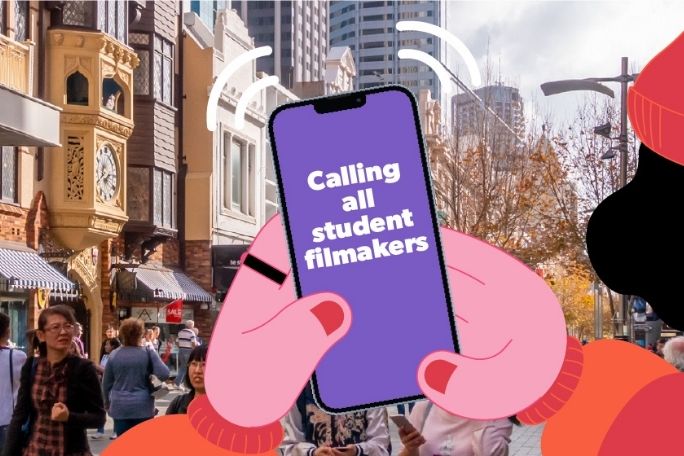Lesson summary
This lesson is one of six lessons for Years 3-8, designed to support you and your students to produce quality films for the MobileMuster Film Competition, with the aim of encouraging the community to recycle more of their old and unused mobile phones. The 2022 MobileMuster Film Competition is open and the theme is ‘The Science of Recycling’. For information about the Film Competition, visit the MobileMuster website.
This lesson contains brainstorming and planning processes to support students in developing ideas for the MobileMuster Film Competition. Students will be guided through creative processes and work with a group to refine and build out their ideas. They will storyboard their films, share their drafts with peers and integrate their feedback. Students will then go about bringing their films to life for the competition, with the option of sharing their films with a wider audience.
If your class is new to mobile phone recycling you might like to engage them in the topic using this lesson, Interviews on Recycling – Years 3 & 4 or this lesson, Changing Behaviour – Years 5 & 6.
Learning intentions:
Students will...
- be able to brainstorm ideas around a specific topic
- be able to apply rating strategies to help them identify quality ideas
- be able to use established criteria to shape creative work.
Success criteria:
Students can...
- make judgments and decisions about their own ideas
- plan a film using a storyboard
- consider consumer perspectives when developing work for an audience.
Lesson guides and printables
Lesson details
Curriculum mapping
Australian curriculum content descriptions:
Year 3 HASS:
- Present ideas, findings and conclusions in texts and modes that incorporate digital and non-digital representations and discipline-specific terms (ACHASSI061)
Year 4 HASS:
- Present ideas, findings and conclusions in texts and modes that incorporate digital and non-digital representations and discipline-specific terms (ACHASSI082)
Year 5 HASS:
- Influences on consumer choices and methods that can be used to help make informed personal consumer and financial choices (ACHASSK121)
- Work in groups to generate responses to issues and challenges (ACHASSI102)
- Reflect on learning to propose personal and/or collective action in response to an issue or challenge, and predict the probable effects (ACHASSI104)
Year 6 HASS:
- The effect that consumer and financial decisions can have on the individual, the broader community and the environment (ACHASSK150)
- Work in groups to generate responses to issues and challenges (ACHASSI130)
- Reflect on learning to propose personal and/or collective action in response to an issue or challenge, and predict the probable effects (ACHASSI132)
Syllabus outcomes: GE3-4
General capabilities: Numeracy, Critical and Creative Thinking, Personal and Social Capability
Cross-curriculum priority: Sustainability
Relevant parts of Year 3 achievement standards: Students reflect on their learning to suggest individual action in response to an issue or challenge. Students communicate their ideas, findings and conclusions in oral, visual and written forms using simple discipline-specific terms.
Relevant parts of Year 4 achievement standards: Students identify the interconnections between components of the environment and between people and the environment. They reflect on their learning to propose action in response to an issue or challenge, and identify the possible effects of their proposed action. Students present ideas, findings and conclusions using discipline-specific terms in a range of communication forms.
Relevant parts of Year 5 achievement standards: Students recognise that choices need to be made when allocating resources. They describe factors that influence their choices as consumers and identify strategies that can be used to inform these choices. They describe different views on how to respond to an issue or challenge.
Relevant parts of Year 6 achievement standards: Students explain why it is important to be informed when making consumer and financial decisions. They identify the purpose of business and recognise the different ways that businesses choose to provide goods and services. They explain different views on how to respond to an issue or challenge.
Unit of work: MobileMuster Film Competition.
Time required: 180+ mins
Level of teacher scaffolding: High – teachers will facilitate discussions and group work on a film project
Resources required
- Student Worksheets – one copy per student
- A device capable of presenting a video to the class
- Assessment Matrix
- Storyboard Sheet
- Film Making Tips
- Reasons For Not Recycling Mobile Phones (optional)
- The Elephant And The Rider Factsheet
- Script Writing Tips (optional)
Skills
- Collaboration
- Communication
- Community engagement
- Creativity
- Critical thinking
- Digital literacy
- Problem solving
Additional info
This lesson has been developed as part of Planet Ark’s National Recycling Week. Following this lesson plan is an ideal way for your school to take part in MobileMuster. You’ll be joining thousands of amazing teachers in making a difference and creating positive environmental change. Take part in the Schools Recycling Right Challenge for Planet Ark’s National Recycling Week. Register your lesson or other activities today!


Welcome back!
Don't have an account yet?
Log in with:
By signing up to Cool.org you consent and agree to Cool's privacy policy to
store, manage and process your personal information. To read more, please see
our privacy policy here(Opens in new tab).
Create your free Cool.org account.
Many of our resources are free, with an option to upgrade to Cool+ for premium content.
Already have an account?
Sign up with:
By signing up to Cool.org you consent and agree to Cool's privacy policy to
store, manage and process your personal information. To read more, please see
our privacy policy here(Opens in new tab).